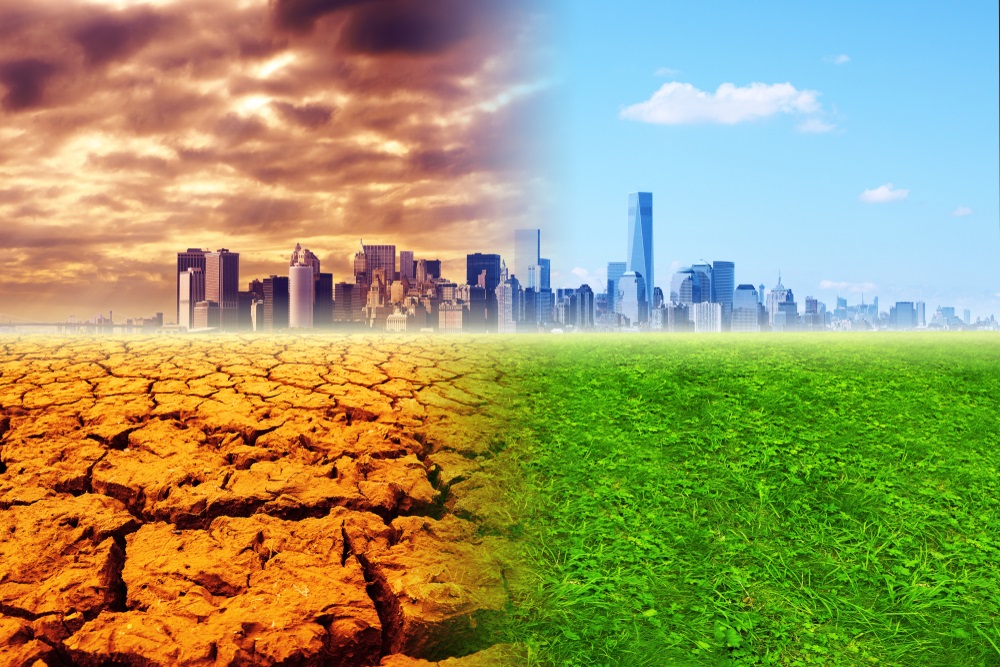By Connor Rosoman, International Socialist Alternative
We are living through a decisive period in the fight against climate change. A recently leaked report from the UN’s Intergovernmental Panel on Climate Change (IPCC) has warned that at current rates, we are heading for 3C of warming — well above the 2C limit set by the Paris Agreement to avert a climate disaster.
But this disaster is already unfolding, with tragic consequences. In Zhengzhou, China, 12 people have died after being trapped in flooded subway carriages following extreme rains. In Germany and Belgium, dozens have died in unprecedented flooding. In the US and Canada, severe heatwaves have taken hundreds of lives. It is clearer than ever that we need to act now — not just in 10 or 20 years.
In light of this ongoing catastrophe, November’s COP26 conference in Glasgow, Scotland itself will pose important questions about how to seriously tackle climate change.
Since the last summit, notable only for delaying any action until this year’s conference, we have seen that capitalist leaders like Joe Biden are prepared to make big promises under the pressure of the crisis we are living through. Biden himself has failed to deliver on many such promises, including on the climate. On one hand, he has vowed to “advance environmental justice” whilst on the other, refusing to act against new oil pipelines such as Line 3 and the Dakota Access Pipeline (DAPL).
Meanwhile, a growing list of big business affiliates to the COP26 highlights that any kind of “system change” is off the table for these discussions. Clearly, this year’s conference will not provide any serious solutions for workers and young people facing the worst of this crisis. But it will be an important opportunity to get organised and build a fight for real action.
The climate movement in 2021
The Earth Strike of September 2019, which represented the peak of the climate movement, saw over 7 million mostly young people around the world take to the streets in 150 countries. Since then though, the movement has been through something of an ebb.
In this vacuum of organising, many young people have looked at other routes to continue the movement.
This includes the rise of Green Parties, especially in Europe. In other cases, people have looked to individual actions, “beyond politics”, through organisations such as Extinction Rebellion (XR). But this kind of action, without a clear idea of system change or the forces that can bring it out, will not be able to deliver the kind of decisive change we need.
What kind of forces do we need?
The initial waves of school strikes pointed toward an approach based on mass mobilisations of young people, linking up with the organised working class, particularly in the Trade Unions. When workers take strike action, they can grind society to a halt. Although smaller-scale actions can be effective, a movement with the backing of the workers’ movement will be essential in winning action on climate change.
This could include coordinated strike action between unions between different countries to bring the globalised capitalist system to its knees, as part of a genuinely international movement against climate change.
A mass climate movement would need to link up with other struggles of workers and young people, such as the struggles against attacks on our right to protest internationally, against sexist and racist oppression, and of workers fighting against mass job losses as a result of the pandemic — all of which have an interest in ending climate change. It would also highlight the systemic nature of climate change, and how it ties into the wider capitalist system responsible for the multi-faceted crisis facing ordinary people right now. This would be an important step not just in fighting for climate change, but for making the popular idea of “climate justice” a reality as well.
Socialism is survival
This would have to be linked to a clear programme for fundamental system change. That means challenging capitalism and fighting for a socialist society where decisions about what is produced and how are decided democratically. Under capitalism, where production is based on the endless drive for greater profits, environmental effects are treated as an “externality”. This focus on short term profit is an inbuilt feature of capitalism. As a result, we see that it is the big corporations themselves that contribute vastly toward the destruction of our planet, with over 70% of CO2 emissions coming from just the top 100 companies worldwide.
Additionally, the food industry accounts for up to 26% of total greenhouse gas emissions. Food is massively overproduced even as millions go hungry worldwide. It is totally unsustainable, but as long as it continues to make a profit, these companies will continue their destructive course.
The technology exists to rapidly replace fossil fuels with sustainable energy sources such as water, wind and solar power, and to produce food along more sustainable lines. But none of these companies will sacrifice their profits to make such a transition willingly.
A socialist programme on climate change would involve bringing the big polluters that contribute the overwhelming majority of emissions into democratic public ownership — we can’t control what we don’t own, after all. On that basis, we could plan production in a way that takes into account the environment and the lives of working people. We could immediately begin to address mass greenhouse gas emissions, and the general wastefulness of the current system — including plastic waste and deforestation. Crucially, at the same time, we could protect all jobs, repurposing them and opening up new ones for a mass programme of green jobs.
Start building for mass, international protests around COP26
The climate crisis has not waited for us to deal with COVID-19, but it has shown that under capitalism, the international cooperation needed to deal with a large-scale crisis is not possible. Instead, the coronavirus was allowed to become a worldwide catastrophe through problems such as vaccine nationalism, where capitalist states and big business put competition and profit ahead of doing what is needed to fight the virus. More broadly, the approach of the ruling class has been marked by a reactive approach to the virus, with none of the foresight or planning needed to tackle it effectively.
The last COP summit was met with mass protests of over half a million people. We need to start organising now to build for massive counter protests at COP26 itself in November, as well as local protests in countries around the world.
A COP26 coalition, involving dozens of different campaigning groups, has already begun preparing for protests. This should include mobilising workers and students on a mass scale — trade unions will need to organise their members to turn up in force and student unions at colleges and universities should arrange for transport to maximise turnout. This should be seen as the start of a new, stronger climate movement with a clear programme of action.
ISA will be building for protests at the conference over the coming months, and we will also be organising an international contingent to put forward the need for socialist change, not climate change. We are an international organisation because climate change, like all aspects of capitalism, is an international issue — we have to organise internationally to fight back, and there is no time to lose!
We say:
- Fossil energy use is responsible for about 85% of the anthropogenic CO2 emissions produced annually. We need to end the burning of fossil fuel for energy and plastic production in the next few years and make a drastic turn to technologies that use renewable energy sources (wind, sun, waves etc) and hydrogen*. The technology to do that is available. What the system lacks is the political will to make the transition. (*Hydrogen, in order to be environmentally friendly, should be produced through water electrolysis, powered by renewable energy sources technologies and not from or with the use of natural gas and other fossil fuel)
- The fossil fuel industry and its products account for 91% of global industrial greenhouse gas emissions and about 70% of the greenhouse gas emissions related to human activity. Just 100 companies globally account for roughly 71% of industrial greenhouse gas emissions and a half of emissions on the planet linked to human activity! (See: The Carbon Majors Database report, p. 7&8). None of them will give up willingly the foundation upon which their profits thrive. We need therefore to bring these companies under the ownership and control of society, use their wealth to convert them, without job losses, to companies that will produce energy and fuel using renewable energy sources and hydrogen technology and plan energy production based on social needs and not capitalist profits.
- A very small number of corporations control the vast majority of the world’s food production and trade. They are responsible for 75% of deforestation worldwide, accounting for 15–20% of CO2 emissions, the destruction of other valuable ecosystems and the mass use of agrochemicals which affect both nature and our health. Food and agribusiness are also the second largest contributors to other greenhouse gas emissions, such as methane, (56%). They are responsible for 19–29% of the total greenhouse gas emissions related to human activity. We need to take these corporations from the hands of the capitalists, stop deforestation, organise a mass worldwide reforestation programme and plan food production in a sustainable and eco-friendly way, which includes growing more of our food locally, using traditional varieties of seeds and livestock and also (re)educate the population on the issue of excessive meat consumption and its negative effects both on the environment and on personal health.
- We must implement a mass public investment plan in high quality and efficient, free, public transit, eco -friendly construction and house upgrading, recycling and repairing facilities, instead of incinerating waste and/or shipping it abroad. All of these measures are more than affordable if the wealth we all produce is not appropriated by a small elite who control the economy and the political establishment.
- All these actions as well as those needed to repair the environmental damage of ecosystems could provide millions of decent new jobs. Workers in the industries and sectors hit by the necessary transition must be guaranteed jobs and retraining with no loss of pay. Investing in renewable energy provides far more jobs: for every one job provided by fossil fuel investment, the same money produces 5–7 “green” jobs.
- We need a big increase in public funding for democratic and independent scientific research to better understand and combat climate change, to further develop technologies for the production and storage of green energy, to further develop environmental friendly materials (for ex. materials that will replace plastic, environmental friendly concrete and building materials) etc. Government money that now is spent on subsidies, tax breaks and incentives for fossil fuel corporations should be directed to research. There is no need to stress that the results of this research should belong to the whole of society and be used for common welfare. They should not be allowed to be bought, patented and used for profit by big business.
- This is OUR planet, so we should democratically plan and run the economy on the basis of the right of everyone for a life free of poverty, oppression and destruction; on the basis of sustainability to ensure that we all have a future on this planet. Fight capitalism to replace it with a society based on meeting people’s needs, not corporate profits, on environmental respect not destruction, on true democracy not corporate control of the economy and political life: a democratic socialist society!












